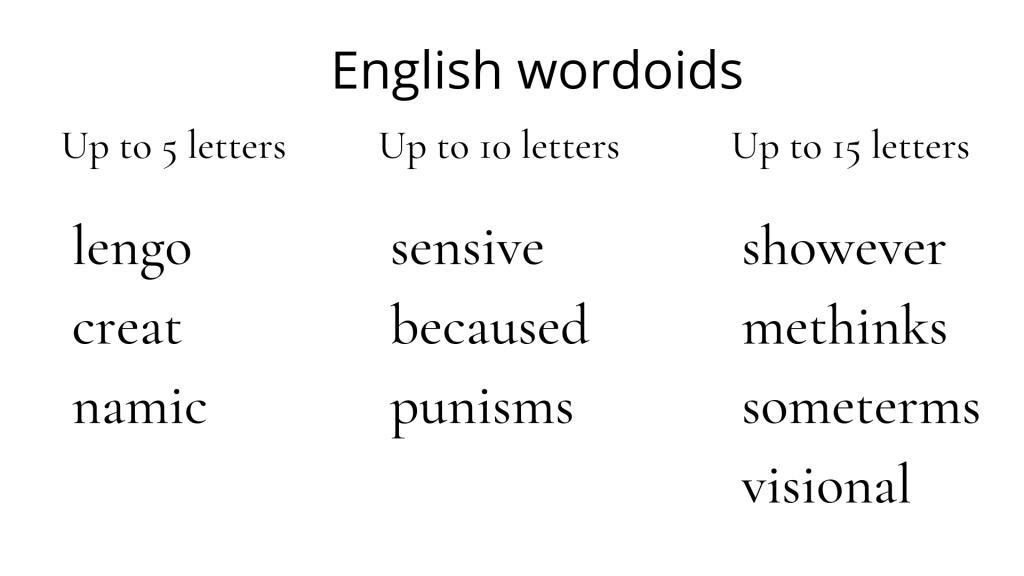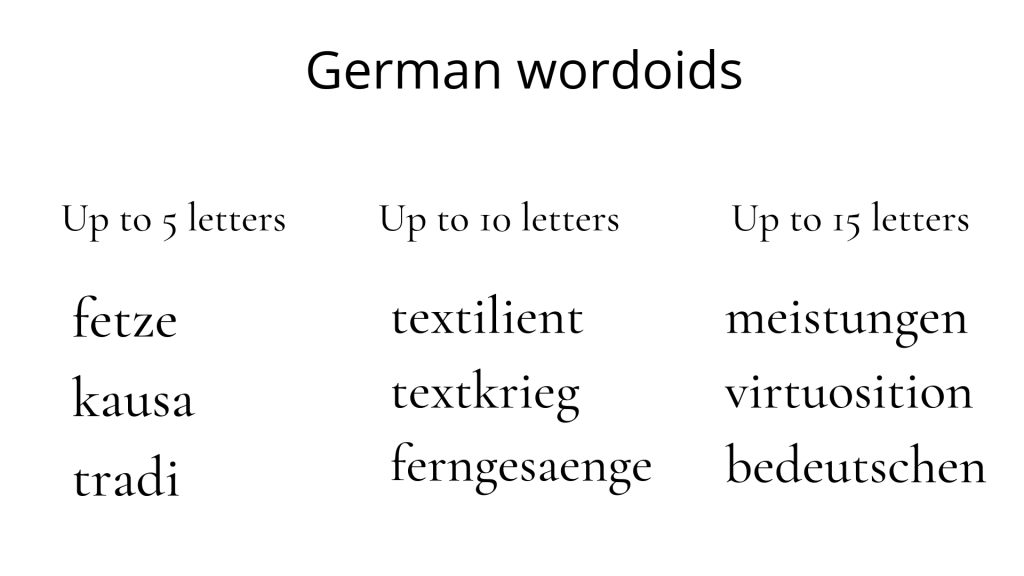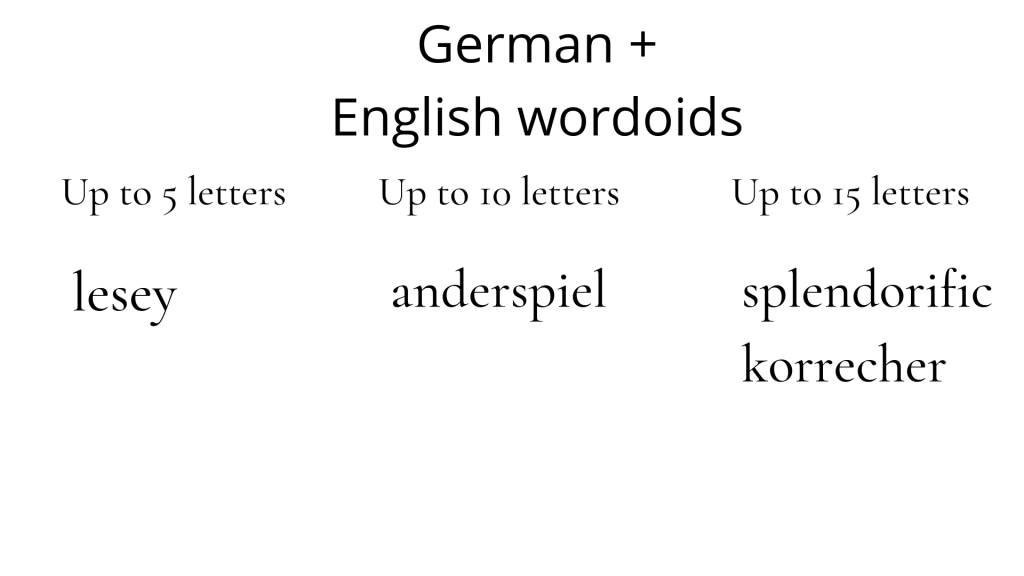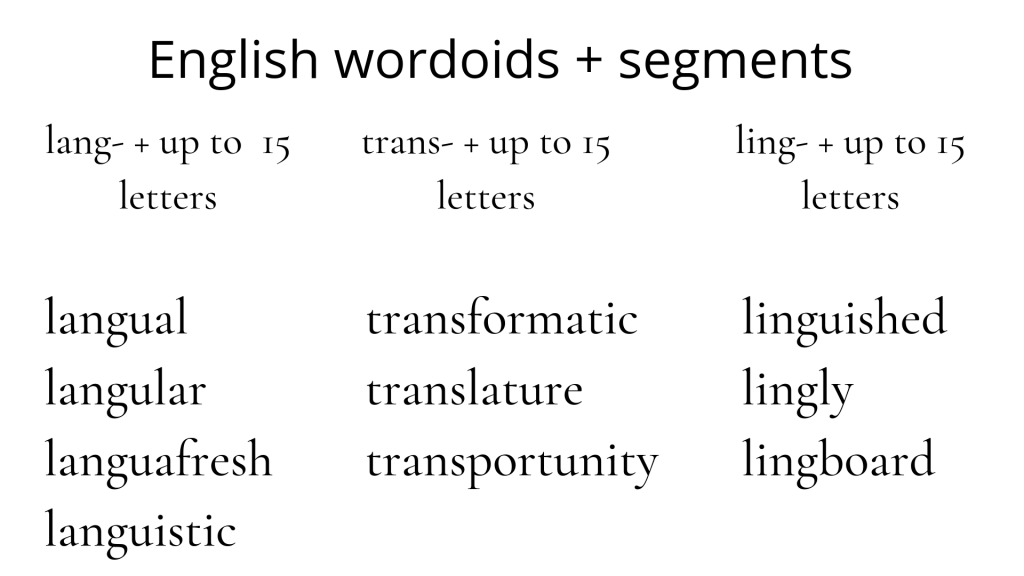The Wordoid Web App Test—Gimmick or More?
Else Gellinek
- October 18, 2019
- 7 min read
- Language

The challenge of coming up with names: Can online tools help?
Working creatively with language is what I do as a translator and transcreator. But we all hit a rut at times, often when it comes to finding names for our own creations. Why not turn to the internet for help? Enter the Wordoid web app.
What to name my company/blog?
Some freelancers like to operate under their own name. It makes their business personal and accessible. Others prefer a catchy business name that expresses what they do. Coming up with the perfect name can be hard, though. And finding a domain name that isn’t already taken poses a challenge of its own. AI and mysterious algorithms to the rescue! Online name generators claim to provide that necessary innovative sparkle in our quest for uniqueness. Let’s put one to the test!
What is Wordoid?
Wordoid is a web app that generates made-up names based on a small list of criteria: output language, maximum length of the wordoid to be created and level of quality, i.e. how natural the wordoid should sound in the selected output language(s).
It’s not really a new app. I found a review dating all the way back to 2009. At the end of 2013, there was a surge of interest in it at, which is how I became aware of its existence. And it’s still around in 2019–as is the ten-year old review!
What makes Wordoid especially neat is that you can look up domain availability right from the results. Or you can filter out ones that are already taken. That way there’s less risk of falling in love with a wordoid only to realize later that someone else beat you to it.
Exactly how Wordoid works isn’t clear. I imagine that it contains preloaded word or morpheme lists for each output language and then allows a certain degree of deviation from the linguistic norms of the output language depending on the settings chosen by the user. Using Wordoid is like throwing a bunch of morphemes in a bag, shaking them around and then seeing which morphemes got stuck together and which phonemes/letters (?) break off in the process. The generated wordoids follow some linguistic constraints, yet not enough to already be contained in the output language’s lexicon.
The science of naming
Nancy Friedman wrote an excellent article, The Five Types of Names, in which she distinguishes between generic, descriptive, suggestive, arbitrary and fanciful names. For the purpose of this experiment with Wordoid, two of these types of names are important:
- Fanciful names are completely made-up. They have the meaning that you as the inventor assign to them. Getting people to recognize a made-up word and assign the desired meaning to it can be a slog. In the English-speaking business world, fanciful names are quite popular – just think of XEROX, Exxon or Google. Obviously, theses names are unique by virtue of being invented by you.
- Suggestive names encourage certain positive associations in the users’ minds and can be a powerful tool for a business. Use the to ascribe traits or features to your business or product. Good examples are Grove, the online store for natural products, and the cosmetics brand Glossier.
Wordoid lets you throw real words into the algorithm. As such, it has the potential to help you find both suggestive and fanciful names.
The Wordoid test results
In the interest of science, the translation industry and procrastination, I spent a few minutes generating German and English wordoids that might work for translators or other language professionals. I used the highest quality setting for all the wordoids I generated, ie. they were set to sound as natural as possible. The wordoids listed below are samples I picked from the first few result pages. They were ones I thought might have some potential for further naming efforts.
You be the judges.
German-based wordoids are much less suited to our cause than their English counterparts. The longest German wordoids with up to 15 letters contained the best suggestions. For wordoids with a maximum length of 5 letters, I had to click through more than 300 wordoids to find the (admittedly rather weak) examples I listed above. Maybe the Wordoid approach is simply not suitable for shorter German words.
German + English wordoids
As a further feature, you can combine languages. I tried English + German wordoids and most of the suggestions sounded like mangled Dutch or another wholly unrelated language. It took me a while to find the few suggestions listed below. Meager results, overall.
The purely English wordoids (see above), on the other hand, mostly sounded appropriately English. But maybe we’re simply more accustomed to English wordoids as brand names?
English and seed segments
You can also choose short segments that should occur in the wordoid: at the beginning, at the end, or somewhere in the middle. And this is where it gets interesting, if you are looking for a name that will contain a typical translation-related syllable. (And it makes you wonder how quite a few translation agencies found their names …)
I did a quick trial run with some predetermined wordoid beginnings, using English as the output language.
Some of these look pretty familiar, don’t they?
Wordoid alternatives
Wordoid isn’t the only kid in town when it comes to name generators. A quick Google search provided several other options that you might like to try. Worst case, you’ll have some fun. Best case, one of them might just deliver a really good name.
I tested all of these using “transcreator” as a seed keyword.
- Namelix: Free AI name generator that then tries to sell you a domain. It suggested “copy/paste” as a possible business name, which is kind of hilarious.
- Oberlo Business Name Generator: My favorite suggestions were “Husky Transcreator” and “Transcreator Zero.” I have a hunch that I might still be able to get those domains.
- BizNameWiz Creative Business Name Generator: My first question is where this company got its own name from. That said, this site lets you filter suggestions by industry. Hard to tell how this works. What I can say is that when I filtered for the “Communication” industry, my all-time favorite suggestion vanished: Transcreator Munchkin. Priceless! (The same name generator is also available as the more stolidly named Business Name Generator.)
- Wix Business Name Generator: This one lets you pick the desired style of the name. I chose “creative.” The best suggestions were “Designy [sic] transcreator” and “Scooter Transcreator.” The magic of the algorithm at work, I guess.
Conclusion
My conclusion after my highly unscientific Wordoid test is that it works quite well for English. Finding the English suggestions took me all of 5 minutes, which makes the Wordoid app a nice, free tool for English branding and naming inspiration (and it’s fun).
None of the wordoids were immediately suitable, in my eye. But even some of the completely randomly generated English wordoids could prove to be useful starting points for a naming process. And being able to preset wordoid segments is a very attractive feature, if you are looking for a more suggestive name.
One thing is for sure: Wordoid is yet more proof of how willing the human mind is to assign meaning to strings of letters or sounds — and how effortlessly we do this.
(Obviously, we need to extensively research any name we come up with for our business to make sure that we don’t violate any copyrights or trademarks.)
Updated October 18, 2019: Spruced up the images, added some fresh information and links to similar services






